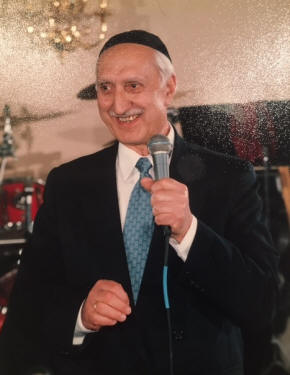
Born into a devout Jewish family in Khansar, Sion Hakakian’s lifelong commitment to Judaism spanned decades. From his teaching and leadership roles in Tehran to his migration to New York, Hakakian’s impact on Jewish education and spiritual guidance remained steadfast, enriching communities across borders.
Early Life
Birth and early education
Born in 1936 in Khansar, a district of Isfahan, Sion Hakakian grew up in a devout Jewish family. His father, Khodadad Hakakian, was a prominent merchant in the local market. Sion completed his primary education at Shapour School while also studying Jewish theology and law under the guidance of his father and Mullah Yehuda. After completing his formal education, he entered the private sector with the support of his father.
Religious devotion
From a young age, Sion was deeply committed to his Jewish roots, dedicating much of his time to studying Jewish theology and law. His study of the Tanakh, combined with his interactions with Torah scholars, fueled his passion for further religious exploration. He also actively participated in Jewish cultural organizations, strengthening his connection to his faith.
Moving to Tehran
Teaching certification
In 1960, Hakakian relocated to Tehran, where he joined the Ozar HaTorah Cultural Center. After two years of dedicated study in Jewish jurisprudence, he earned his certification and began teaching Hebrew and religious studies at the Ganj-e Danesh school under Harav Isaac Meir Levi. His pursuit of knowledge led him to attend seminars, teacher training sessions, and Talmudic study groups, enriching his understanding. Soon after completing a comprehensive course in theological studies, covering religious education for elementary to high school levels, he gained official recognition as one of the prominent religious figures in the community.
Teaching career
For over 45 years, Sion Hakakian taught Hebrew and religious studies at several Jewish schools in Iran, including Ettehad (Alliance), Ganj-e Danesh, Roohishad, and Abrishami (Moses Ibn Imran). In the 1970s, he was invited to teach at ORT Tehran, a non-profit Jewish organization, where he taught Hebrew, religious studies, and Jewish history. Throughout his career, he organized seminars to train religious educators, significantly contributing to the education of the Jewish community.
Hakakian extended his teaching to non-Jewish students interested in Jewish history and Hebrew. Additionally, he conducted special classes along with other teachers on Fridays at the Abrishami Synagogue for students whose schools did not have a religious studies program, ensuring that Jewish students fulfilled their religious education requirements.
Marriage
In 1963 (1342 in the Persian calendar), he married Pirooz Dokht Ebrahimi, and together they had a daughter and a son.
Religious Leadership
Through his unwavering dedication to Judaism, Sion Hakakian became a respected religious leader. His sermons on religious and social matters, particularly regarding the Torah and Judaism, deeply resonated with the Jewish community.
Yusef Abad Synagogue
Sion Hakakian, a highly respected and distinguished member of the Yusef Abad Synagogue, along with Aghajan Shadi, a key figure in the synagogue council, faithfully served the community for over two decades. As a rabbi, he took on the responsibilities of Shaliach Tzibur (prayer leader) and Chazan (cantor) during Shabbat services and Jewish holidays. In addition to leading prayers, Hakakian was deeply committed to educating the congregation through his Dvar Torah (Torah teachings). He was also available to address religious inquiries from both Jewish congregants and non-Jewish visitors.
Member of the Jewish Committee
In 1985, Sion Hakakian, following recommendations from colleagues and several members of synagogue councils such as Yusef Abad Synagogue and Abrishami Synagogue, ran for the Jewish Committee elections. He received strong support and was elected to the Board of Directors, chaired by Parviz Yeshayaei. During his two terms, which lasted until 1993, Hakakian headed the association’s cultural committee and served as a member of the Dispute Resolution Council.
Throughout his eight years of service, Hakakian was actively involved in both educational and social matters. In addition to teaching religious studies and Hebrew at Jewish schools, he worked diligently to enhance cultural and educational initiatives within the community. His efforts extended to resolving social issues, particularly family disputes, which became increasingly pressing in the Jewish community.
Post-Revolution Challenges
Mr. Hakakian’s tenure at the Jewish Committee coincided with a particularly challenging period, marked by the emigration of many Jewish families from Iran, leading to a sharp decline in school enrollments. This period also saw the aftermath of the eight-year Iran-Iraq war, which further complicated the responsibilities of community leaders. Despite these obstacles, Hakakian remained dedicated and approached his duties with unwavering determination.
Migration to New York
In 1998, Hakakian and his wife traveled to New York for their son Behram’s wedding, held in the Great Neck area. After the wedding, encouraged by his family, he decided to remain in the United States rather than return to Iran. In recognition of his distinguished service to the Jewish community in Iran, the board of the Beth Hadassah Synagogue—one of the largest religious and cultural centers for Iranian Jews in Great Neck—invited Hakakian to serve as a council member. Many members of the synagogue were his former colleagues and students from Tehran. Hakakian embraced this new role immediately, dedicating himself even more than before to his religious duties in the community.
Continuing religious service
Even in retirement and in a foreign land, Sion Hakakian continues to serve the Iranian Jewish community in Great Neck as a teacher, prayer leader (Shaliach Tzibur), and spiritual figure at Beth Hadassah Synagogue. With his extensive experience and deep love for Judaism, Hakakian remains committed to his work and dangerous responsibilities, delivering religious lectures on Shabbat, offering weekly Dvar Torah (sermons), and teaching Hebrew to both children and adults.


 فارسی
فارسی